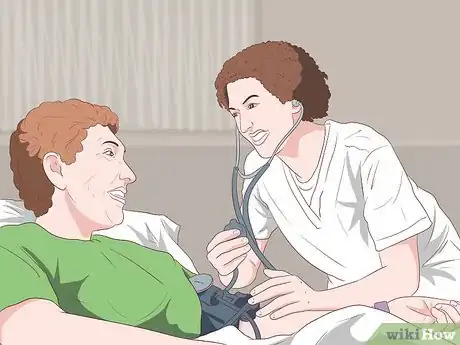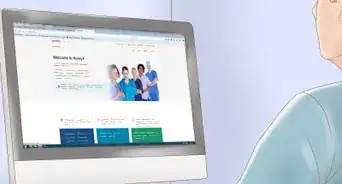This article was medically reviewed by Luba Lee, FNP-BC, MS. Luba Lee, FNP-BC is a Board-Certified Family Nurse Practitioner (FNP) and educator in Tennessee with over a decade of clinical experience. Luba has certifications in Pediatric Advanced Life Support (PALS), Emergency Medicine, Advanced Cardiac Life Support (ACLS), Team Building, and Critical Care Nursing. She received her Master of Science in Nursing (MSN) from the University of Tennessee in 2006.
There are 8 references cited in this article, which can be found at the bottom of the page.
This article has been viewed 72,440 times.
Being a nurse is more than just getting your degree. Being a nurse requires you to have very specific skills in order to provide the best possible care to your patients, including the core attributes of genuine caring, nurturing, ability to teach, being health conscious and a good communicator. Being a good nurse means you excel at these skills and consider them essential to the work you do everyday. These skills can be developed in advance of a career in nursing, but you may not know your success performing some of these skills until you’re on the job.
Steps
Preparing Yourself to Be a Good Nurse
-
1Think critically. Nursing is a lot like a game of chess. It’s complex and you have to think several moves ahead. You need to be able to assess a patient critically to determine his medical needs, while taking multiple factors and potential outcomes into account.[1]
- Critical thinking is a process by which you review the situation, analyze what’s going on, and question what you don’t know. You can break the process down into 5 steps:[2]
- Step 1: Identify the goal, the problem, or the issue.
- Step 2: Review and diagnose the goal, problem, or issue. What information do you have available about the goal, problem, or issue? Based on the information you have, what’s the best resolution?
- Step 3: Explore your options. Think about what the resolutions may be, and how and who would actually achieve them.
- Step 4: Actually carry out the resolution. Get it done.
- Step 5: Reflect on your success or failure. What went well and what didn’t go so well? What can you do better or differently next time? How do we learn from this experience?
- Critical thinking is a process by which you review the situation, analyze what’s going on, and question what you don’t know. You can break the process down into 5 steps:[2]
-
2Communicate effectively. Nurses need to be able to communicate with their patients in order to understand how their patients are feeling and what they are concerned about. Communicating effectively means you can listen well when someone else is speaking to you, and that you can speak clearly and concisely to someone else (e.g. patient, doctor, other nurses, family members, etc.). As a nurse you’re also likely to make a lot of notes whether in a physical chart or on the computer, therefore you must also be able to communicate effectively in writing as you may not be there in person to explain what you meant.[3]
- Keep in mind that you will be dealing with many different nationalities, including people who may not speak the same language as you or the doctor. Find out what services are available to the patient to help them communicate effectively — are there interpreters on staff? Are you aware of any cultural beliefs or practices that might interfere with their health?
- As a good nurse you need to be able to listen to a doctor’s instructions and carry out those instructions quickly without needing to clarify every detail. In order to do this you need to be able to listen to the doctor in what is likely a fast-paced and hectic environment while you’re doing something else.[4] At the same time, don't hesitate to ask questions to clarify what is needed. Doctors, just as nurses, need to communicate effectively. If it is not clear what the physician/provider is trying to relay, keep asking questions.
- An exceptional nurse not only listens and carries out instruction, they advocate for their patients. Because of your excellent listening skills, you’ve developed an understanding of your patients, how they feel, and what they want. You should also understand that your patients may be a little intimidated speaking up and asking their doctor specific questions, or making requests. As their nurse, you may need to do the speaking up for your patients. Encourage your patient to write down questions that they want answered and that you know them as well to help facilitate questions. If the patient can not ask them, then ask the questions for your patient.
- To learn more about being an effective communicator, you can read the following wikiHow article, How to Communicate Effectively.
Advertisement -
3Be detail-oriented. Being detail-oriented means you pay attention to both the big stuff and the small stuff. When dealing with a patient, even the smallest anomaly or symptom can be a big deal, so you need to always be paying attention. Being detail-oriented means you ensure all your patients get the exact treatment they need, when they need it.[5]
- While not exactly the same, being detail-oriented has a lot to do with being organized. It’s easier to pay attention to the details when you are organized.
- Detail-oriented also means being accurate. In the medical field you can’t estimate or guess at the amount of medication you give a patient, you need to be accurate. Your patient’s life may depend on it.[6]
- Being detail-oriented also means paying attention. Getting distracted or allowing your mind to wander will likely result in you missing something important. Because all details regarding your patient’s care are critical, you need to remain focused and on task at all times.[7]
-
4Organize efficiently. Nurses, especially those working in a hospital, need to deal with multiple patients at the same time. Each patient has their own personal requirements that are critical to their well-being. Each patient also has his or her own personality and emotional needs. As a nurse you need to be able to organize yourself to keep track of who each of your patients are, what their treatments are, when they need their treatments, and the small details about the patient that will help them feel better (both physically and emotionally).[8] Being able to organize yourself efficiently means being able to do the following things when needed:
- Learning to say no. While you may not be able to say no very often at work, you can certainly say no in your personal life. Sometimes being able to clear out all the stuff you don’t really want to be doing will lower your stress level overall and help you become more focused when you’re at work.
- Finding balance in your life. There is such a thing called caregiver burn out. Always ask yourself before accepting an extra shift: what the benefit it and what is the cost? If the cost is personal loss of perceived health, sleep, enjoyment, then the extra money is not worth it.
- Asking for help. If you are new to the nursing field, you are going to need to ask for help. Don’t be afraid to ask, just ask. Once you’ve asked chances are you’re going to be able to move forward with what you need to do, and understand how to efficiently carry out that task the next time.
- Prioritizing. Being organized means being able to prioritize all the tasks you have on your to do list. Knowing which ones are more important or which ones have the earliest due dates.
- Spending your time wisely. Think about all the things you need to do in the next little while, and carry those tasks out efficiently. If you need to go to the storeroom for one thing, think about all the things you need in there over the next little while so you only have to make one trip. Don’t waste your time doing repetitive and unnecessary tasks.
-
5Maintain physical stamina. Most nurses will be on their feet for their entire shift, which can last 12 hours or more. Nurses may also need to restrain patients, help patients walk from one place to another, hold patients up, move patients to and from a bed or gurney, and other physically demanding tasks. If you aren’t up to the physical requirements of the job, you will likely be in a lot of pain at the end of a shift.[9]
- Personal health must be observed first — how can you advise health-related behavior if you do not observe it yourself?
- Physical stamina isn’t just about being able to do physical activities, it’s about being able to do them over a long period of time, over and over again.
- As a nurse you’re allowed to wear scrubs and comfortable shoes — take advantage of this. There is nothing worse than being on your feet for 12 hours in shoes that are really painful.
-
6React and think quickly. The medical profession in general isn’t the type of profession where you can always just sit back and "wait and see." In many cases, as a nurse, you’ll notice something and need to react to it quickly. You won’t always get the chance to pause and evaluate all the options and debate back and forth with another nurse as to the best course of action — sometimes you just need to act.
- Being able to think and react quickly comes with experience and confidence. The more experience and confidence you gain, the faster your ability to react will become.
- Thinking and reacting quickly can also include knowing when it’s time to get help from someone else ASAP. Don’t worry if you may be overreacting or if someone will have a bad opinion of you because you bothered them, those things aren’t important. Keep in mind that your patient’s well-being is always the most important thing and react quickly when that well-being is in jeopardy.
- Reacting quickly doesn’t mean forgoing critical thinking; it means going through the critical thinking process quickly and carrying out your decision immediately.
Learning on the Job
-
1Understand and have the ability to be compassionate. One of a nurse's main jobs is to take direct care of patients. You’ll likely see these people at their worst. Nurses need to understand that their patients are human beings that are probably stressed, scared, depressed, upset, in pain, and confused. This understanding requires the ability to be compassionate and empathetic. Being able to put yourself in your patient’s shoes will help you understand what she's going through, and what she needs from you.[10]
- Often times, because a patient sees nurses most often, those nurses get the brunt of any anger the patient is feeling. Being compassionate and empathetic means you do not take this anger personally. Patients are likely sick or injured and not having a very good day! Understanding that some patients may need to release their anger in order to reduce their stress or fear is what being compassionate is all about.
- In addition to patients, nurses often deal with the family and friends of their patients. Being compassionate and empathetic means being able to show those family members and friends that you truly do care about your patient and are doing your absolute best to help her.[11]
- The following six steps can help you learn to be a more compassionate person:[12]
- Step 1: Listen without judgement or formulating an immediate response. Try to understand the person's feelings, needs, and wants so that you can formulate a plan to best help her.
- Step 2: Reply back to the speaker based on her emotions and not her words. For example, mean and angry words are likely a sign of someone who is scared or fearful.
- Step 3: Make sure you have someone who is compassionate to you. This means having your own support system at or outside of work. If you have a million problems on your mind, it may be harder to care about the problems of others.
- Step 4: Think about the whole person, not just who she is at that very moment. You’re going to see many people at their worst, but that’s not who they really are. Remember that there is much more to your patients than just what you see.
- Step 5: Think about a time when you were in a similar situation. You may have an actual memory of your own you can borrow from, or you may simply need to imagine yourself in that situation. Think about all the emotions you went through (or would go through) and how you felt (or would feel) in that situation.
- Step 6: Be able to forgive yourself for failure. In essence, have some compassion for yourself. You’re not going to be perfect. You’re going to make mistakes. But you’re human, and that’s normal. Don’t beat yourself up.
-
2Have emotional stability. Being a nurse means you’re going to see people at their very worst. You’ll likely have to take care of patients who are about to die. You may need to take care of patients in an extreme amount of pain. You may need to take care of patients who have just been diagnosed with a life-threatening illness. Constantly being around people who are suffering can take an emotional toll on you. As a nurse you need to be able to control your emotions while you’re on the job, and not allow those emotions to cloud your judgement or slow your reaction time.[13]
- Being emotionally stable doesn’t mean keeping all your emotions bottled-up forever. It means knowing when the time is right for letting those emotions out. And allowing yourself that emotional release on a regular basis. Try exercise, time with friends, yoga, reading, and developing hobbies.
- Emotional stability also doesn’t mean developing an ice-cold personality where you do not allow yourself to care about anything. You need to allow yourself to care about your patients in order to provide them with compassion and empathy.
- Having, or being able to have, emotional stability may mean you have to do certain things outside of work so you’re able to control your emotions at work. One helpful way to develop stable emotions and have better control over your mood is to practice mindfulness.[14] This means being in the moment without thinking about the past, the future, or anything judgmental.
-
3Take responsibility. Being a responsible nurse means not cutting any corners. Not allowing yourself to make an error, but if you do, making sure the proper people know about the error you made and making sure it’s corrected as soon as possible. Being responsible also means using your best judgement when evaluating a patients' needs and making good decisions that are in the best interests of your patients.[15]
- If you are a nurse that works in an emergency room or an operating room, or something similar, you also need to be responsible with your time. You need to understand that things do not always go as planed, and emergencies do not happen on a schedule that matches your shifts. A good nurse is prepared to work longer if necessary and understand that’s just part of the job.
-
4Respect everyone. In addition to being compassionate, empathetic, and sympathetic to your patients and their needs, you also need to be respectful and non-judgemental about the decisions your patient has made in life. It is not up to you, as a nurse, to judge your patients. It is up to you to help them and make sure they leave you care in the best possible condition — regardless of how they may have ended up in your care in the first place. It also means not treating patients differently because of their backgrounds, ethnicity, or personality. A homeless man who is being treated for a drug overdose deserves just as much respect from you as a pregnant woman who has been hit by a car.[16]
- Being respectful of your patients also means being truthful with them. When communicating news — good or bad — you need to understand that the patient has the right to honesty. Be straight-forward with your patients, but do it respectfully and with compassion.
-
5Keep calm under pressure and during a crisis. Keeping calm means maintaining your level-headedness. It means having confidence in what you’re doing and the decisions you’re making. Your confidence will grow not only throughout your education, but the longer you’re on the job. And as such, your ability to remain calm will also improve. As a nurse, you can’t panic when something unexpected happens, and you can’t freeze up because you aren’t sure what to do.[17]
- When you’re first learning your job and there’s an emergency situation, a more experienced nurses may push you out of the way and take over. Do not take this personally or be upset. Use this moment to observe exactly what’s going on, what the nurse is doing and how, and the specific details that are driving the nurse’s decisions. Watching a more experienced nurse, especially in a crisis, can be one of your most useful learning experiences.
- Find out if there are trainings offered to help you work through specific scenarios such as sudden cardiac arrest, respiratory arrest, or stroke. By attending these trainings, you can practice going through these steps in a less intense environment so that in the real situation, you will be able to work through it easier.
-
6Adapt to new and constantly changing situations. As a nurse no two days will ever be the same. While you may have some routine, it is likely that that routine will also change every now and again. No two patients are going to behave the same, even when they’re getting the exact same treatment. Nurses need to be adaptable and flexible. Nurses need to understand that their work environment and job requirements will change on a daily basis. Being flexible and adaptable, and just going with the flow, will not only help your day go smoother, it will help reduce the amount of stress you feel.
-
7Improve your knowledge constantly. Nurses, just like many professions, are constantly learning. Whether they learn through a formal classroom environment, or simply by observing, doesn’t matter. What matters is that you are constantly improving your knowledge and skills, and recognizing specific areas where you might need improvement. It also means receiving feedback from your peers and supervisors critically, and working with your supervisor and others to correct any deficiencies you have with your skills.[18] [19]
References
- ↑ http://www.bls.gov/ooh/Healthcare/Registered-nurses.htm#tab-4
- ↑ http://ctb.ku.edu/en/table-of-contents/analyze/analyze-community-problems-and-solutions/think-critically/main
- ↑ http://www.bls.gov/ooh/Healthcare/Registered-nurses.htm#tab-4
- ↑ https://www.daymarcollege.edu/blog/17-qualities-make-good-nurse
- ↑ http://www.bls.gov/ooh/Healthcare/Registered-nurses.htm#tab-4
- ↑ https://www.gcu.edu/blog/nursing-health-care/top-11-qualities-good-nurse
- ↑ http://blog.methodistcollege.edu/what-makes-a-good-nurse-6-key-traits
- ↑ http://www.bls.gov/ooh/Healthcare/Registered-nurses.htm#tab-4
- ↑ http://www.bls.gov/ooh/Healthcare/Registered-nurses.htm#tab-4
- ↑ http://www.bls.gov/ooh/Healthcare/Registered-nurses.htm#tab-4
- ↑ https://www.daymarcollege.edu/blog/17-qualities-make-good-nurse
- ↑ http://tinybuddha.com/blog/6-ways-to-deepen-your-compassion-to-help-other-people/
- ↑ http://www.bls.gov/ooh/Healthcare/Registered-nurses.htm#tab-4
- ↑ https://positivepsychology.com/mindfulness-emotional-intelligence/
- ↑ https://www.daymarcollege.edu/blog/17-qualities-make-good-nurse
- ↑ http://blog.methodistcollege.edu/what-makes-a-good-nurse-6-key-traits
- ↑ http://blog.methodistcollege.edu/what-makes-a-good-nurse-6-key-traits
- ↑ http://blog.methodistcollege.edu/what-makes-a-good-nurse-6-key-traits
- ↑ http://www.rasmussen.edu/degrees/nursing/blog/what-i-wish-someone-told-me-before-becoming-registered-nurse/
- ↑ http://www.rasmussen.edu/degrees/nursing/blog/what-i-wish-someone-told-me-before-becoming-registered-nurse/
About This Article
To be a good nurse, it's really important that you have great communication skills since you'll need to listen carefully to patients, carry out doctors' instructions, and communicate with family members. You should also be very detail-oriented since even small symptoms or mistakes can have a big impact on your patients. Additionally, make sure you take care of yourself and live a healthy lifestyle, which will make it easier to work long shifts on your feet without feeling as worn out. It's also important that you're able to keep calm under pressure and not panic when you don't know what to do since you'll encounter a lot of emergency situations as a nurse. For advice from our Medical co-author, like how to be organized as a nurse, keep reading!




















-Step-12-Version-2.webp)

-2.webp)



















































Medical Disclaimer
The content of this article is not intended to be a substitute for professional medical advice, examination, diagnosis, or treatment. You should always contact your doctor or other qualified healthcare professional before starting, changing, or stopping any kind of health treatment.
Read More...